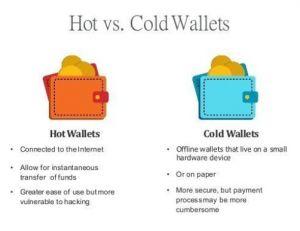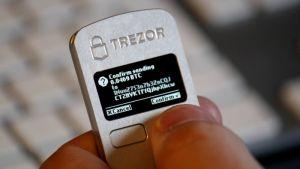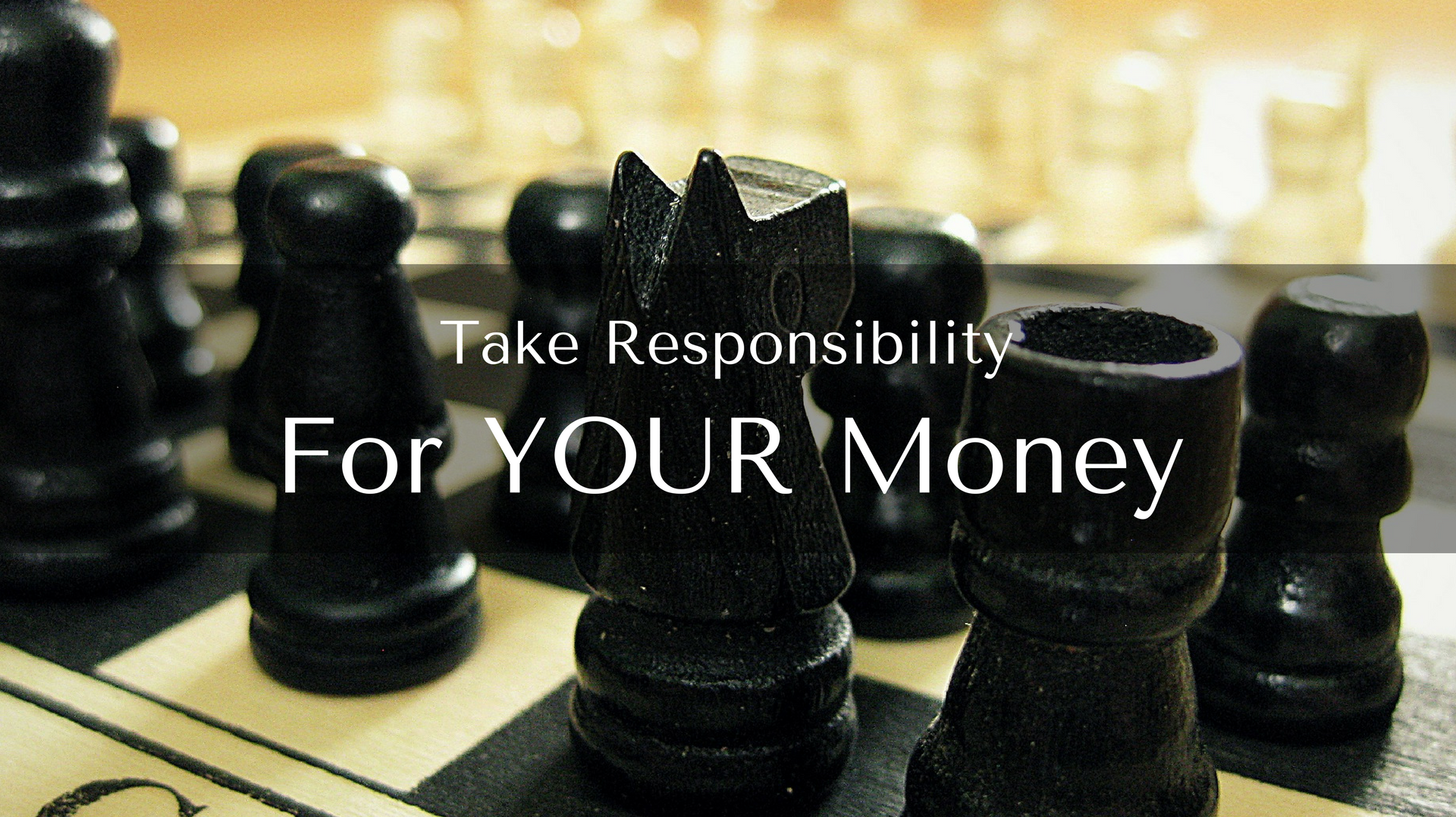- How to store Bitcoins and other cryptocurrencies properly.
- Power Guide for saving your money
- When something went wrong …
- What kind of wallets I do not recommend to use?
- Use Cold Storate
- My scheme.
- What about other cryptocurrencies?
- How To Store Bitcoin?
- What is a Bitcoin wallet?
- Bitcoin wallet types
- How To Store Bitcoin?
- How to store bitcoin
- Table of Contents
- Which Bitcoin wallet should I choose?
- Software wallets: convenient buying, selling, storing, trading, and using
- Hardware wallets: long-term storage for larger amounts of bitcoin
- Web wallets (AKA cryptocurrency exchanges): convenient buying, selling, and trading
- Paper wallets: alternative to hardware wallets, unique method for gifting bitcoin
How to store Bitcoins and other cryptocurrencies properly.
Power Guide for saving your money
Feb 24, 2017 · 6 min read
When something went wrong …
I will tell only a few possible stories that are waiting for you in the case of lack of computer literacy:
- If you catch some “shit” in an attempt to generate a license key for some extremely desirable game. This software will scan your hard disk, then it will find the private key. After a few milliseconds a new transaction appears on the bitcoin network that will take all of your hard-earned money
- If your email provider will loose the database of its users. Then some guy John will buy it in the darknet and quickly begin to run different semantic analyzers. After a couple of hours, it will lead to the disappearance of all bitcoins from all of the services that use authorization via email.
- In other case, some guy Peter, who works for Google and has a admin rights (like Snowden had) simply steal your Bitcoins from some service. And nobody will notice that. Will be like magic.
- Some virtual exchange, where all of your crypto is stored will disappear along with all the money. Exactly what Mt.Gox did and dozens of others.
- If you catch some trojan in the process of hunting for a cool porn. It can encrypt all the files on the hard disk. Afterwards it will find all links to your wallets and it quickly realize how much money you have and how much money it can demand from you. If you wan’t pay your hard drive will not be decrypted. This is a tragic scenario. After all, you can’t even send money to this hacker, because your keys will stay on an encrypted hard drive!
- If you lose your unencrypted laptop or phone.
- If you catch a clever Keylogger, none of your activities will save you from epic fail.
- If you will get an email from the service where your crypto-money stored. However the name of website is not blockchain.info but, for example, blokchain.info, and all will look identical. If you click on the link and successfully authorises it, your bitcoins will disappear simultaneously.
- One morning you will wake up without your money because the NSA agent will take advantage of some delicious backdoor in Windows operating system.
- If you decide to transfer cash to the smart contract that you think will do what it supposed to do, in fact, it will do something else. So this smart contract turned out to be smarter than you are.
Clearly, this is not a complete list. But maybe it will give you some ideas when something goes wrong. Now you see, cryptocurrencies — is not bucks. You are fully responsible for it’s safety. Neither Jesus Christ nor the Pope, nor Vladimir Putin nor Donald Trump will not be able to help you if you do something wrong. But those guys can’t take your money if you do everything in a right way.
With great power comes great responsibility.
My ove r all recommendation is to increase computer literacy. A specific recommendation is act strictly according to instructions without unnecessary actions.
What kind of wallets I do not recommend to use?
Here is one basic rule:
Do not give ANYONE your private key.
This means — do not use any of these wallets:
- Online web wallets, like blockchain.info, Coinbase, etc. In generally, all wallets which keep the private key on their servers.
- Any hot wallets. Any app on computer or phone which is used with Internet connection. It can be used with small amounts to make payments, but not for storing your whole money.
Use Cold Storate
Cold storage in the context of Bitcoin refers to keeping a reserve of Bitcoins offline.
Methods of cold storage include keeping bitcoins:
- On a USB drive or other storage media
- On a Paper wallet
- On a bearer item such as a physical bitcoin.
- Use a offline Bitcoin Hardware wallet
My scheme.
I will share my own method which I use. The main thing to understand is the basic rule:
Do not give ANYONE your private key.
Step 1 — Create a bootable USB flash drive
Create a bootable USB flash drive with permanent encrypted storage. Tails will be perfect, because it has an Electrum (Bitcoin wallet) and encryption in the box. Set up two passwords for login and for encryption.
Tutorial here
Step 2 — Create a cold wallet.
Load with Tails (without the Internet). Create your cold wallet using Electrum. Come up with a complex password and write down 12–13 words (seed) on paper or think of something other place.
This seed — is your money. These 12 words will allow you to regain access to the wallet from any computer in the future.
You must also select the check box on the option “View Transaction Before Signing” in the wallet Settings. Thus, you will cause Electrum to show the transaction details before enter a password (i.e. signature) and send the transaction to the network.
Step 3 — Create a “watch-only” wallet in the main OS or mobile phone.
Copy your Bitcoin public address from Electrum into a text document on a flash drive and shutdown the Tails.
Create a ‘watch-only’ wallet using your public address or public key in any wallet app you like on main OS or on mobile phone. For example in Electrum you need to do the following steps:
— Create new wallet
— Choose “standart wallet”
— Choose “Use public or private keys”
— Paste your PUBLIC key in the next window > Create
Now we can view the balance of our bitcoins and generate new addresses from public key, but we can’t spend any of our bitcoins.
Step 4– Spend Bitcoins in a secured way
To send your Bitcoins in a secured way: run Tails again (do not use Internet).
Then make the transaction > a window will appear (as we have enabled the checkbox ““View Transaction Before Signing”).
At first click “Sign” and then when you enter the password, click “Save”.
Do not send the transaction to the network and do not enable internet, just copy the transaction file to the flash drive.
Start in the main OS > Open your wallet > In the menu choose something like “Load transaction from file” > load the signed transaction from a flash drive > and push “Broadcast” button
Thus the signed transaction is sent to the Blockchain from the ‘watch-only’ wallet, and your private key is not leaked anywhere from your Tails usb.
Very important. Always check address AFTER you have copied it in the field. Just going back to wallet, remember the first 2 digits and last 2, and then go to the form and check whether these are the numbers that you copied! First, we sometimes make mistakes. Practice shows that quite often. Second, now there are so smart viruses that will determine when you copied the bitcoin address to the clipboard, and replace it to another address.
What about other cryptocurrencies?
The same logic can be used in relation to all other cryptocurrencies.
I agree that this scheme is not the most comfortable to use, because you need to make a lot of manipulations with multiple OS and usb devices.
If you are looking for a good usability — look at buying a hardware wallet. These hardware wallets works by the scheme described above, but also they have some unique advantages:
- multiple cryptocurrencies in one secured wallet
- private keys are often stored in a protected area of a microcontroller, and cannot be transferred out of the device in plaintext
- immune to computer viruses that steal from software wallets
- can be used securely and interactively, as opposed to a paper wallet which must be imported to software at some point
- You can feel like James Bond
Some of these wallets (e.g. Ledger Nano S wallet) support not only Bitcoin but also Ethereum, Litecoin, Dogecoin, ZCash, DASH, Stratis and more. Also it has integrations with many wallet apps like Electrum, BitGo, Copay, GreenBit and others.
That’s all. I hope you got the main rule. Please, write your comments and questions below. And one more thing: let’s spread the knowledge. Recommend and Share this article. Thank you for reading!
Источник
How To Store Bitcoin?
If you want to know how to store bitcoin, here is the main thing you need to know — bitcoins are stored on the Bitcoin blockchain network. A special program – so-called “wallet” – is required in order to access and use one’s coins.
If you want to learn not only how to store your bitcoin, but how to store it as securely as possible, the following information will help you to understand how to store bitcoin properly.
What is a Bitcoin wallet?
The wallet safeguards the secret code you need to use your bitcoins and helps manage transactions, something like an internet banking account. The code, which serves as a password, is called a “private key” and is vital to the security of your money. Anyone who gets your private key can steal your bitcoins. And if you lose your key, your bitcoins are gone, too. So it’s essential to protect private keys against accidental loss and back them up.
There’s also another code called a “public key” – that’s the address where others can send you bitcoins.

Bitcoin wallet types
All bitcoin wallets are classified into two categories — hot and cold wallets.
Online (“hot”) wallets, where the private key is stored online or on devices connected to the internet – e.g., on exchanges or other websites, computers, tablets, or smartphones.
Offline (“cold”) wallets, where the private key is stored on paper or offline hardware like a password-protected USB, or simply in one’s brain (when you memorize a special phrase to access your funds).
Online, or “hot,” wallets are less secure due to the threat of hacking. Website wallets are especially vulnerable as you must reveal your private key to a third party. But hot wallets are more convenient for daily use.
It’s thus recommended to use both types of wallets – hot wallets to hold small amounts of bitcoin for daily transactions, and cold, or offline, wallets for storing more substantial sums. In any case, you can have as many wallet addresses as you like.

Furthermore, both hot and cold Bitcoin wallets are classified into hardware, desktop, mobile, web, and paper wallets.
Hardware wallets. Bitcoin wallets that store your private keys on external devices, such as encrypted USB sticks or similar. The most popular brands are hardware wallets by Trezor and Ledger.

Paper wallets. The term generally refers to a physical copy or paper print of your public and private keys. Here’s how you can generate one.
Desktop wallets. Desktop wallets are software installed on computers or laptops. Their security depends on the security of your computer.
Mobile wallets. Mobile wallets, like desktop ones, are software wallets, but usually, they are substantially smaller and simpler.
Web wallets. Web wallets include browser plugins, website wallets, exchange wallets, and other sorts of “hot” wallets.
To learn more about their pros and cons, and how to choose the right bitcoin wallet for you, see your guide on how to choose a Bitcoin wallet.
How To Store Bitcoin?
Storing bitcoin is easy, but doing so securely often requires careful planning and time.
You have to find the best combination of storage for you. If you’re going to use bitcoin daily, it’s likely that you want to use a convenient mobile or web wallet. If you just bought a lot of bitcoin for long-term storage, then cold storage is the right way to store them.

Speaking of storing bitcoins, all it takes is a transfer to your private wallet address, and they are stored after your transaction is confirmed.
What takes the most time and effort is making sure that no one has access to it, so make sure to step up your security game before getting large sums in cryptocurrency. Please read our guide on “how to store cryptocurrency safely” to learn more about it.
If you want to learn more about bitcoin security in general, please see our “Bitcoin security tips for beginners” guide.
Now that you’re familiar with all the different types of wallets and bitcoin storage options, it is up to you to choose the right method and do everything in your power to protect your private keys.
Have any suggestions about this entry? Let us know.
Источник
How to store bitcoin
Creating a Bitcoin wallet is as easy as installing software on your mobile device or laptop/desktop.
When you install the app, your Bitcoin wallet is automatically created. You can then receive bitcoin to your wallet immediately, store it safely, and use it as you please.
Table of Contents
- Which Bitcoin wallet should I choose?
- Software wallets: convenient buying, selling, storing, trading, and using
- Hardware wallets: long-term storage for larger amounts of bitcoin
- Web wallets (AKA cryptocurrency exchanges): convenient buying, selling, and trading
- Paper wallets: alternative to hardware wallets, unique method for gifting bitcoin
Which Bitcoin wallet should I choose?
There are a number of wallet apps on the market from a variety of vendors and with different features to choose from. We welcome you to try the Bitcoin.com Wallet, the fully non-custodial crypto wallet trusted by millions.
The Bitcoin.com Wallet is what’s known as a ‘software wallet‘. It provides an excellent combination of security and ease-of-use. Depending on how you’re using your bitcoin though, you may want to consider another wallet type. Here’s a rundown on the different types of Bitcoin wallets and their respective pros & cons:
Software wallets: convenient buying, selling, storing, trading, and using
- Software wallets take the form of an app which is downloaded for free to your phone or desktop. You simply open up the app and can make Bitcoin transactions in an instant.
- Since software wallets are connected to the Internet, there’s a small risk of hacking. Therefore, it is recommended to not store large amounts of bitcoin in your software wallet.
- While there have been a few isolated cases of software wallets being hacked, by far the greater risk is that you lose your ‘private key,’ which is like the password to your wallet. Therefore, it’s critical to backup your wallet and adhere to password management best practices.
Tip: Make sure the software wallet you’re using is fully non-custodial like the Bitcoin.com Wallet, meaning only you can access your coins — not the wallet provider. This protects you from the risk of fraud or bankruptcy by the wallet provider.
Hardware wallets: long-term storage for larger amounts of bitcoin
- Hardware wallets, also known as cold wallets, are physical devices created specifically for the purpose of storing cryptocurrencies. They offer the best security for your digital assets because they insulate you from the Internet, making it effectively impossible for hackers to infiltrate your wallet.
- Since they take more time to access, hardware wallets aren’t ideal for making frequent Bitcoin transactions. Use them for long-term storage instead.
- As with software wallets, you need to back up your private key and adhere to password management best practices.
Tip:В Hardware wallets are well worth the money — especially if you own a lot of bitcoin. To make sure the device isn’t compromised, only buy one from a company you can trust.
Web wallets (AKA cryptocurrency exchanges): convenient buying, selling, and trading
- Centralized cryptocurrency exchanges are a popular place for many newcomers to buy their first bitcoin because they make the buying process very simple. It’s like opening a trading account.
- However, the cryptocurrency exchange itself retains control over the funds in your account. Not only does this expose you to the risk of the exchange getting hacked or going bankrupt, it also means you have to ask for permission to withdraw your bitcoin, wait longer to withdraw, and usually pay higher transaction fees for withdrawals.
- We recommend using cryptocurrency exchanges only for trading (not for storing your bitcoin).
Tip:В Cryptocurrency exchanges are not a secure place to store digital assets. Once you’ve bought your bitcoin, you’re advised to move it to your software or hardware wallet if you don’t plan on trading it immediately.
You can start your trading journey today with the Bitcoin.com Exchange.
Paper wallets: alternative to hardware wallets, unique method for gifting bitcoin
Paper wallets are created by downloading a software package, then running the software (for security, preferably in an offline environment) to generate a public/private key pair which you print out on a piece of paper. Having created a paper wallet, you can send any amount of bitcoin to the wallet address. To spend it, you use the private key written on the paper to sign the spend transaction.
Like hardware wallets, paper wallets allow you to store bitcoin completely offline. This makes them a lower-cost alternative to hardware wallets.
Since the public/private key pair is written on the paper, handing over the paper to another person is similar to handing over a cash note. This makes paper wallets a novel way to exchange bitcoin face-to-face.
You can create your own Bitcoin Cash paper wallets at Paperwallet.bitcoin.com.
Buy as little as $30 worth to get started
Choose from Bitcoin, Bitcoin Cash, Ethereum, and more
Источник



